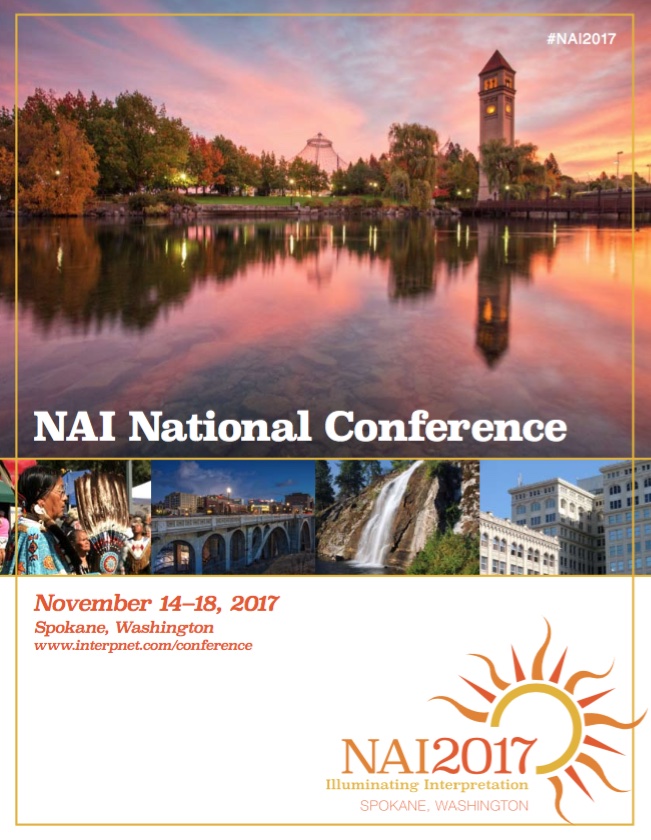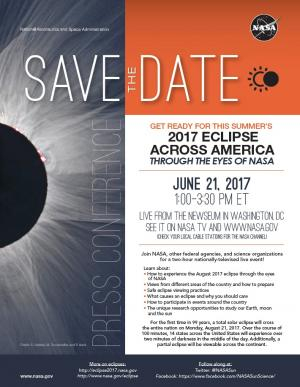- Details
Our World is Changing - Do you have the tools to stay relevant?
A Two-day pre-conference workshop on climate science and communication at the 2019 National Association for Interpretation National Conference
November 11-12, 2019
Denver, CO

Join us in beautiful Denver, Colorado for this Earth to Sky workshop designed to help you meet the challenges of connecting with visitors on climate change. In our experiential and collaborative learning environment you will learn foundational climate science, engage with scientists and peers, and gain exposure to new technologies.
- Details
"Interpreting Climate Change" Workshop in Spokane, WA, Nov. 2017 - Content Available On-line
Here's your save-the-date announcement for a two-day Earth to Sky workshop on interpreting climate change, which will be held as part of the National Association for Interpretation’s Annual Conference in Spokane, WA this November. This workshop will include key elements common to all of our courses - science content from NASA science specialists, and interpretation techniques from experienced interpreters and ETS alumni, joined together in a collegial environment.
Interpreting Climate Change
2-Day Earth to Sky Workshop at the NAI National ConferenceSpokane, WashingtonInterpreting climate change can be challenging!It’s complicated, and audiences may respond on a wide variety of emotional andintellectual levels. This two-day, highly interactive workshop will join interpretersand NASA science and education specialists to learn from each other about climate scienceand communication. We’ll cover some basics of the science, and explore appropriate techniques foraddressing this subject with a variety of audiences, including youth. Abundantinterpretation, education and scientific resources will be provided to supportparticipants’ climate change interpretation efforts.The first day of the workshop will be held at Turnbull National Wildlife Refuge, and the second will be at the conference hotel. (Transportation from the conference hotel to the refuge will be provided, as well as lunch on both days.)When: Our workshop is November 13th – 14th 2017Where: NAI Conference runs November 14th – 18th 2017, Spokane, WashingtonRegistration and Lodging: Reserve through NAI http://www.interpnet.com/conferenceRegistration will open soon; the cutoff will be October 10th.It is recommended that participants reserve lodging ASAP.Target Audience: Employees from the USFS, USFWS, and other Federal, State and Municipal agencies, as well as non-profit and private organizations with science communicators,interpreters, environmental educators and educationspecialists.Participants should have some experiencewith interpretation/science communication. Knowledge of climatescience is not required.For more Info (and to add yourname to the mailing list for updates) contact: Anita Davis This email address is being protected from spambots. You need JavaScript enabled to view it.
- Details
Save the date for this event being broadcast from the Newseum in D.C. 1:00- 3:30 PM ET
Join NASA, NPS and other agencies, plus science organizations for this live two-hour broadcast – see it on NASA TV and www.nasa.gov. (Check your local cable stations for the NASA Channel or watch it on line). This press conference will be chock full of information about the eclipse, and will serve as a kick-off for increased publicitiy about this wonderful celestial event.
Learn about:
How to experience the August 21 eclipse through the eyes of NASA
Views from different areas of the country and how to prepare
Safe eclipse viewing practices
What causes an eclipse and why you should care
How to participate in events across the country
The unique research opportunities to study our Earth, moon and the sun
Click on the poster to download and use it.
- Details
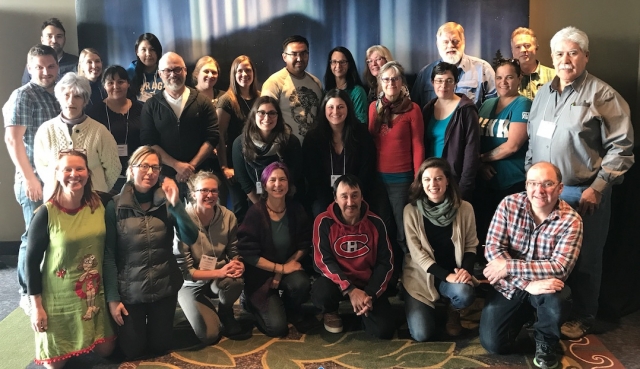 Earth to Sky - Canada, Climate Change Science and Communication Course in Yellowknife, NWT recently completed
Earth to Sky - Canada, Climate Change Science and Communication Course in Yellowknife, NWT recently completed
April 19-21, 2017
This course focused on climate science and communication as it applies to NW Canada. The heart of the course consisted of three days of face-to-face sessions held at the Explorer Hotel in Yellowknife.
Scientists from NASA Goddard Space Flight Center, the Jet Propulsion Laboratory, several Universities, and the Gov't of the Northwest Territories presented sessions on topics ranging from carbon fluxes in permafrost, and hydrologic changes to NWT rivers, to the effects of climate change on migratory birds. The course included a field trip and tour of the Prince of Wales Northern Heritage Center, where participants experienced a wide range of habitats representing the Arctic, and learned about how the changing climate is contributing to the loss of heritage resources. Representatives from local utilities and planning organizations provided information on climate mitigation efforts.
The course preparatory assignments, video-taped presentations and all course materials are now available on the course home page. Additional regional courses are being planned for a variety of locations in coming months and years.
- Details
Webinar for the Earth to Sky Community of Practice
Wednesday, May 17th, 2017 - Noon-1pm AK Time, (2pm MDT)
This webinar provided an Update about NASA's ABoVE Research Campaign activities being planned for 2017.
View the recording on our webinar archive: May 17, 2017 Webinar with Peter Griffith

The Arctic Boreal Vulnerability Experiment (ABoVE) is part of a broad international effort to study the environmental and societal effects of climate change. Over the next decade, scientists from NASA and other public and private organizations are focusing on this northern region that spans about 2.5 million square miles. The multi-year field campaign will investigate ecological impacts of the rapidly changing climate in Alaska and northwestern Canada, and examine such topics as the thawing of permafrost, the expansion of wildfires, and changes to wildlife habitats. Come and participate in a discussion with NASA’s Dr. Peter Griffith, Chief Support Scientist for NASA’s Carbon Cycle and Ecosystems Office and the ABoVE campaign. Peter will describe the scope of these studies, the focus of the research into the vulnerability and resilience of ecosystems, the implications of changing systems on society and human activities, and detail how individuals can get involved as the campaign progresses. He will also explore the significance of this work for other regions of the world. For more info: http://above.nasa.gov.
See also, this related report released this week at the Arctic Council: ![]() SNOW-WATER-ICE-AND-PERMAFROST-SUMMARY-FOR-POLICY.pdf.
SNOW-WATER-ICE-AND-PERMAFROST-SUMMARY-FOR-POLICY.pdf.
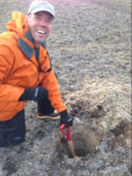 Dr. Peter Griffith is the founding director of NASA’s Carbon Cycle and Ecosystems Office, and is Chief Support Scientist for the Arctic Boreal Vulnerability Experiment (ABoVE). He also directs the team that supports the Carbon Cycle & Ecosystems Focus Area at NASA HQ, NASA’s Carbon Monitoring System (http://carbon.nasa.gov); and the North American Carbon Program (http://www.nacarbon.org), a component of the U.S. Global Change Research Program.
Dr. Peter Griffith is the founding director of NASA’s Carbon Cycle and Ecosystems Office, and is Chief Support Scientist for the Arctic Boreal Vulnerability Experiment (ABoVE). He also directs the team that supports the Carbon Cycle & Ecosystems Focus Area at NASA HQ, NASA’s Carbon Monitoring System (http://carbon.nasa.gov); and the North American Carbon Program (http://www.nacarbon.org), a component of the U.S. Global Change Research Program.
- Details
Archived Webinar Series: Interpreting the Total Solar Eclipse of 2017 !
For the first time in over a century a total solar eclipse will be visible over the entire United States, August 21, 2017. This spectacular total solar eclipse will be visible within a 70-mile wide path stretching across the continental U.S. beginning in mid-morning on the Oregon coast, crossing the United States, and finally disappearing on the South Carolina coast by mid-afternoon.
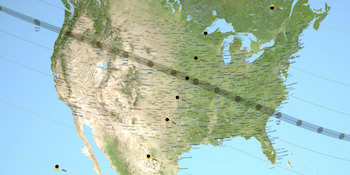 click for larger (high resolution) Those in the path of totality will have the rare opportunity to safely see the Sun’s corona, the beauty of Baily’s beads and the dazzling diamond ring effect. You can get a sense of how the eclipse will progress at your location at http://bit.ly/2ffhTdi
click for larger (high resolution) Those in the path of totality will have the rare opportunity to safely see the Sun’s corona, the beauty of Baily’s beads and the dazzling diamond ring effect. You can get a sense of how the eclipse will progress at your location at http://bit.ly/2ffhTdi
This eclipse will be a unique and powerful opportunity for sharing the excitement of science and the wonder of the Sun and Moon as they create a total solar eclipse on Earth.
The webinar series covers basics about solar eclipses, touches on NASA's research on the Sun, Moon and the Sun-Earth connection, and explores activities, resources and ideas for connecting the eclipse experience with major interpretive themes in parks, refuges and other interpretive sites.
You may view any or all of the sessions which were held January - March 2017.
Tuesday, January 24 – Basics of Solar Eclipses
Thursday, February 2 – Our Sun is an Above-Average Dynamic Star!
Tuesday, February 14 – Without the Moon There Would Be No Eclipse!
Thursday, February 23 – Earthly Connections to the Sun
Tuesday, March 7 – NASA Resources and Activities Part I
Thursday March 16 – NASA Resources and Activities Part II
Thursday March 23 – Interpret the Eclipse!
Webinar abstracts and access to archived sessions and resources are here (site login required).
Also visit our Eclipse Resources for Interpreters Page
- Details
Free Climate Science and Communication Mini-Course!
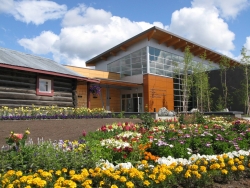 What’s currently going on with climate change in Alaska, and how do we best engage audiences on climate issues? If you’ve been wondering about these and similar questions, save-the-date October 21st, and join the Earth to Sky interagency partnership for an in-person mini-course in Fairbanks, with our partners from NASA, National Park Service, and many other agencies and organizations. Join us!
What’s currently going on with climate change in Alaska, and how do we best engage audiences on climate issues? If you’ve been wondering about these and similar questions, save-the-date October 21st, and join the Earth to Sky interagency partnership for an in-person mini-course in Fairbanks, with our partners from NASA, National Park Service, and many other agencies and organizations. Join us!
- Meet with world-class scientists and communicators and explore the best practices and latest insights into understanding/responding to changing climate
- Hear about the latest research being conducted by the NASA Arctic Boreal and Vulnerability Experiment (ABoVE) Campaign in Canada and Alaska
- Learn tips on climate communication from experienced Earth to Sky alumni
- Explore new tools, including citizen science activities and stunning visual resources from NASA
- Discover useful online resources to help develop your understanding of and ability to communicate about climate
- Become part of a statewide community of engaged educators, working on the best ways to communicate about climate with audiences, both on-site and virtually
- Outline your own customized plan for presenting a climate program or designing a product for use at your work site
And best of all, learn how to stay connected to these scientists and communicators over time. You’re not alone in your efforts - and here’s proof there’s lots of help available!
Target Audience: Federal, State, Municipal, Non-profit and private organization communicators, school educators, and anyone interested in climate literacy. Participation by partners and collaborators is especially encouraged.
What: ETS@AK Mini-course 2016
When: Friday, October 21st, 2016
Where: Fairbanks, Alaska - at the Morris Thompson Cultural and Visitors Center
No Tuition Fee
Full Course Announcement: ![]() ETS-AK_2016_Minicourse-Announcement.pdf
ETS-AK_2016_Minicourse-Announcement.pdf
Application form: ![]() ETS-Mini-course-AK-Application-2016.doc
ETS-Mini-course-AK-Application-2016.doc
For more info or to add your name to our email list of those interested, Contact:
John Morris Earth to Sky - Alaska Coordinator
16542 Marcus Street
Eagle River, AK 99577
This email address is being protected from spambots. You need JavaScript enabled to view it.
907-947-0359
or
Anita Davis
Lead, Earth to Sky Interagency Partnership
Science Systems and Applications, Inc.
NASA Goddard Space Flight Center
This email address is being protected from spambots. You need JavaScript enabled to view it.
Office: (301) 614-6669 or (410) 480-0718
- Details
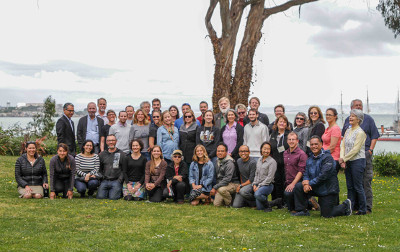 More than 60 scientists and science communicators gathered in San Francisco last month, to talk and learn about changing climate in the Pacific West. This was the second instance of a new regionally-focused training model that Earth to Sky hopes to take to many other regions of the country over the coming years. For three days, at the General’s Residence in Fort Mason, scientists/presenters from NASA and many other organizations including UC Davis, the Marine Mammal Center, federal and state agencies, and non-profit groups, discussed the latest news about climate impacts and their implications to the Pacific Coast. Funding and support for the course was made possible by the NPS Climate Change Response Program, Mather Training Center, and by continuing leadership and generous support from NASA.
More than 60 scientists and science communicators gathered in San Francisco last month, to talk and learn about changing climate in the Pacific West. This was the second instance of a new regionally-focused training model that Earth to Sky hopes to take to many other regions of the country over the coming years. For three days, at the General’s Residence in Fort Mason, scientists/presenters from NASA and many other organizations including UC Davis, the Marine Mammal Center, federal and state agencies, and non-profit groups, discussed the latest news about climate impacts and their implications to the Pacific Coast. Funding and support for the course was made possible by the NPS Climate Change Response Program, Mather Training Center, and by continuing leadership and generous support from NASA.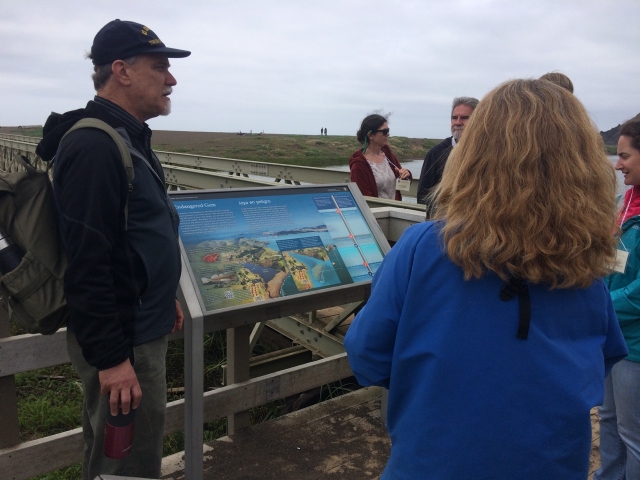
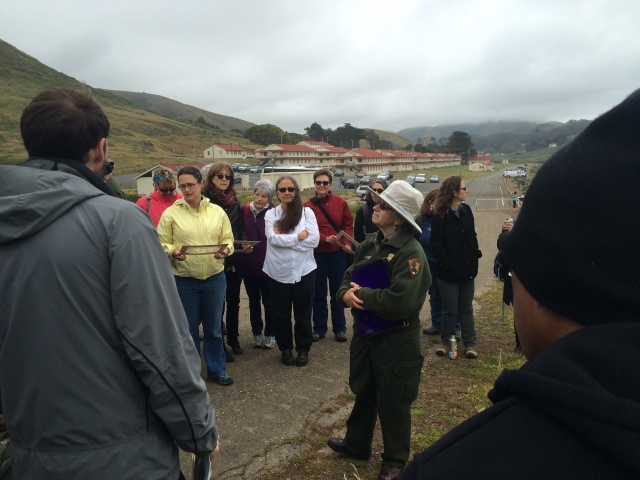 Among the many highlights of the course was a field trip to the Marin Headlands on Wednesday morning. The half day case study included presentations by Will Elder on several Sea Level Rise exhibits, Roxi Farwell demonstrating a ‘Magic Window” teaching tool that helps students see and understand geologic change on the landscape, Kerri McAllister illustrating citizen science and curriculum projects by her organization, NatureBridge, and concluding with a behind-the-scenes tour of the Marine Mammal Center in Sausalito, conducted by Adam Ratner, Guest Experience Manager.
Among the many highlights of the course was a field trip to the Marin Headlands on Wednesday morning. The half day case study included presentations by Will Elder on several Sea Level Rise exhibits, Roxi Farwell demonstrating a ‘Magic Window” teaching tool that helps students see and understand geologic change on the landscape, Kerri McAllister illustrating citizen science and curriculum projects by her organization, NatureBridge, and concluding with a behind-the-scenes tour of the Marine Mammal Center in Sausalito, conducted by Adam Ratner, Guest Experience Manager.Earth to Sky (ETS) is expanding its efforts through this course with new emphasis on partnering, and sharing new research specifically within a locally-based and engaged community of communicators and scientists. We are delighted with its successful launch, and look forward to the many future opportunities and new products that will surely result about changing climate in this region.

